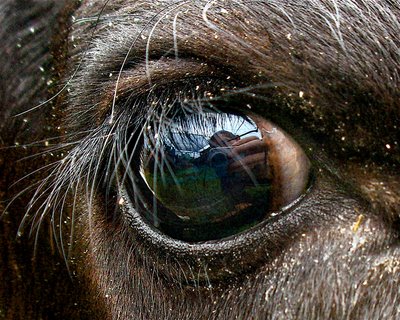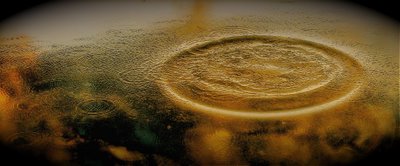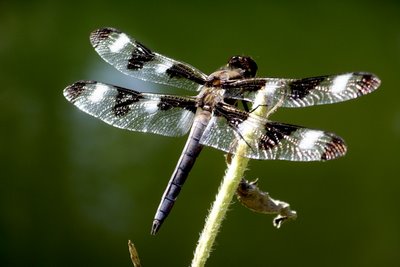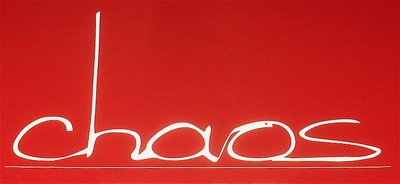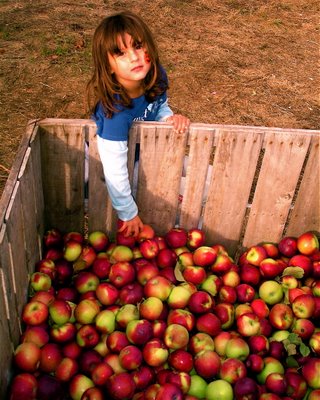 Apple of knowledge, Cider festival, Amherst, NH, October 2004, Pentax Optio 555, Exposure 1/250 sec @ f4.0, ISO 64, with flash © Steven Crisp [Click on the photo to enlarge]
Apple of knowledge, Cider festival, Amherst, NH, October 2004, Pentax Optio 555, Exposure 1/250 sec @ f4.0, ISO 64, with flash © Steven Crisp [Click on the photo to enlarge]Many of us live as though and think that we are objective in our examination of various ideas and concepts. After all, we’re educated. We’re relatively enlightened. We can consider a point of view free from the bias of our upbringing, and consider it on its inherent merits, even if it tends to benefit “them” and perhaps indict “us”.
Nice theory. But how true do you really think that is? I’d say not very true for the vast majority of humans beings (at least at present).
Take many Christians that you know (I only pick on Christians because I have some first hand experience here; trust me, I’ve had these same conversations with a devout Muslim). They say that salvation comes through accepting Jesus Christ as the Son of God, and if this isn’t done (depending on their denomination) you will not be Saved, which basically means eternal damnation (but let’s not get hung up on that).
You know, this is a big benefit for the children that are born into Christian societies. We are a lucky bunch. Consider the child born in Iran, or China, or Thailand, or Japan. The odds of them being exposed to Christianity (in a positive light) during their upbringing is very low. Now some Christians believe if they are never exposed to the teachings of Jesus Christ, they get a free pass from damnation. But not all of the denominations.
Let’s ask ourselves how well we were taught about something other than the Christian faith, or God forbid, the concept of athiesm. Was that a fair and balanced presentation, if there was any exposure at all? You know children are pretty susceptible to the prejudices of their parents. How open minded are the parents that you know? And if you are fortunate to be raised in a liberal enlightened community, consider the rest of the world.
I think our religious
indoctrination is probably the greatest disservice we do for our children. Not that I don’t want them to have a particular faith (or not), but rather, that I wish they would be encouraged to have the inquisitiveness to ask the question why there are multiple faiths, and just what does it all mean to them. And then to go do some honest investigation on their own. And from that, draw whatever conclusion works for them. But, generally speaking, we really stack the deck against this objective and sincere inquiry. And why not — many parents feel their children’s salvation rests upon their indoctrinations.
I hope (and expect) that over time, we will move away from this mindset. The whole notion of “blind faith” is worrisome to me. I don’t believe we need rational proof to consider the spiritual aspects of our lives, but I do believe we need to figure it out for ourselves. And if possible, pursue our spirituality sincerely and genuinely enough until we have our own personal experiences upon which to base our beliefs and insights.
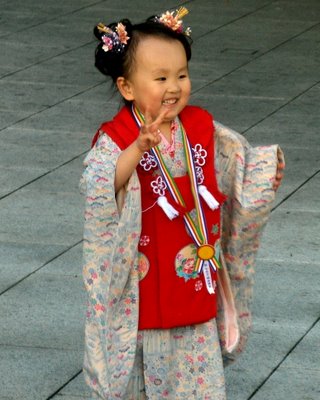 Japanese girl at Shinto shrine, Meiji Jingu Shrine, Tokyo, Japan, December 2006, HP Photosmart R817, Exposure 1/212 sec @ f4.7, ISO 93, no flash © Steven Crisp [Click on the photo to enlarge]
Japanese girl at Shinto shrine, Meiji Jingu Shrine, Tokyo, Japan, December 2006, HP Photosmart R817, Exposure 1/212 sec @ f4.7, ISO 93, no flash © Steven Crisp [Click on the photo to enlarge]And to that end, I share with you this excerpt from Kahlil Gibran’s “The Prophet”. I believe all parents, parents-to-be, and maybe anyone with an influential role in children’s lives, would do well to consider these words, and apply them in their own investigations into the ineffable.
Children
"Your children are not your children.
They are the sons and daughters of Life's longing for itself.
They come through you but not from you, And though they are with you, yet they belong not to you.
You may give them your love but not your thoughts. For they have their own thoughts.
You may house their bodies but not their souls, For their souls dwell in the house of tomorrow, which you cannot visit, not even in your dreams.
You may strive to be like them, but seek not to make them like you. For life goes not backward nor tarries with yesterday.
You are the bows from which your children as living arrows are sent forth.
The archer sees the mark upon the path of the infinite, and He bends you with His might that His arrows may go swift and far. Let your bending in the archer's hand be for gladness; For even as he loves the arrow that flies, so He loves also the bow that is stable."
-- Kahlil Gibran, excerpt from “The Prophet”
"Doubt everything. Find your own light." -- Buddha
 Visiting Butterfly, Tucker Pond, Warner, NH, July 2005, Pentax Optio 555, Exposure 1/320 sec @ f5.6, ISO 64, with flash © Steven Crisp
Visiting Butterfly, Tucker Pond, Warner, NH, July 2005, Pentax Optio 555, Exposure 1/320 sec @ f5.6, ISO 64, with flash © Steven Crisp Sunset and palms, Waikiki, Honolulu, Hawaii, February 2005, Pentax Optio 555, Exposure 1/320 sec @ f4.6, ISO 64, no flash © Steven Crisp [Click on the photo to enlarge]
Sunset and palms, Waikiki, Honolulu, Hawaii, February 2005, Pentax Optio 555, Exposure 1/320 sec @ f4.6, ISO 64, no flash © Steven Crisp [Click on the photo to enlarge]

